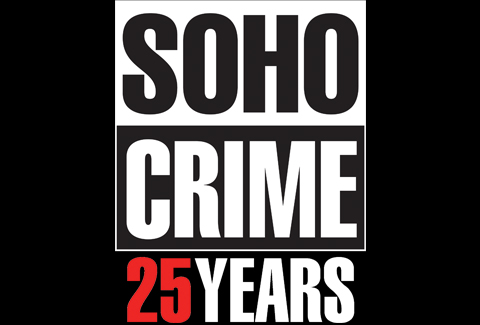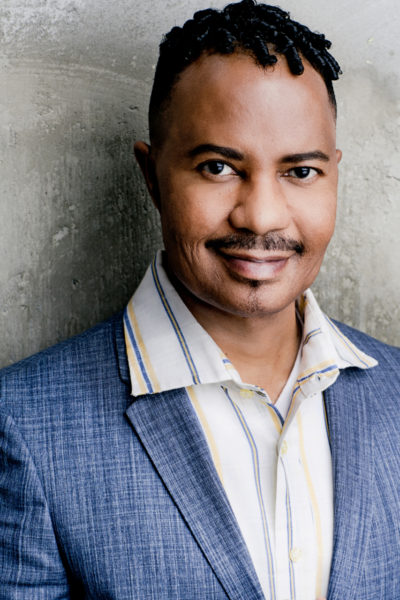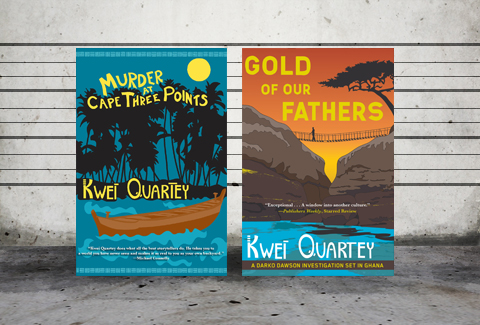
Kwei Quartey’s latest in his Darko Dawson series, Gold of Our Fathers, was just published. Dawson, a Criminal Investigations Department (CID) detective based in Accra, Ghana, takes on illegal gold mining funded by Chinese expatriates. One of these Chinese men ends up dead, and Dawson’s pursuit of truth coupled with his incorruptibility makes him more enemies than he may have bargained for.
It’s a treat to read mysteries set in post-colonial Africa, where the strong culture and traditions of the people of Ghana often run up against the interests of pure greed and multinational corporations.
Quartey, who is also a physician based in Pasadena, California, recently took the time out of his busy schedule to discuss Gold of Our Fathers and elements of his writing process. He also disclosed two things that scare him.

Ed Lin: One thing I love about your books is that apart from the apparent crime that Darko Dawson is pursuing, there’s always the larger picture in terms of the environment itself is usually a victim, too, whether it’s knocking down trees, chemically mistreating the earth to get gold cheaply or poisoning the water while searching for oil. Would you say that your concern about the environment stems from your time in Ghana or from being exposed to the debates in the U.S.?

Kwei Quartey: It’s both, really—because the environmental destruction I saw in Ghana as a boy is now much worse, given the modern-day contributions of multinational pursuits like “big oil,” and at the same time, my ecological sensibilities has sharpened from the American discourse, which has a far more global flavor than it did decades ago.
“Liu” is one of the oldest Chinese surnames and is represented by a character that means, “to kill.” I was really struck by this when I first read the name of the victim. Was this premeditated or a “happy” coincidence?
Full disclosure: it was, and still is, a happy coincidence.
Dawson is often disgusted by the corruption and inefficiency that he sees in Ghana and particularly in his own police force. This however often makes him a target of his own peers. What is it that keeps him in Ghana when a man of his talents could do very well in the U.K. or the U.S.?
But he’s not the only one to whom that applies. I know many Ghanaians who would thrive in the U.S. or Europe, but choose to stick it out in Ghana. That was true of my late Ghanaian father as well. He wasn’t a policeman, but he abhorred corruption in any of its varied forms in Ghana and found aspects of Ghanaian life and the “Ghanaian way” distasteful. He had been to college and university in the U.S. and was sought after by academia there and in the UK, but he chose to live and work in Ghana. Like him, some Ghanaians who despair over their motherland and could well flee its frustrations somehow forge on with a weary determination.
Perhaps Dawson’s creator may be wrestling with conflicts over his own “escape” from the country of his birth. True, my mother is American, but I could have stayed in Ghana and battled it out as a doctor and I would have done okay. Maybe Dawson is the part of Quartey that wanted to stay Ghanaian. I don’t know. It’s just a theory.
Let’s talk about Dawson’s use of weed. He uses it to reach an elevated state, not unlike Sherlock Holmes. Have you ever gotten any flak from members of the law for his choice in meditative supplements?
Members of the law in Ghana? No, I haven’t. Either they don’t care, or they’ve never read my novels, or both. I have freely given copies of my novels to people in Ghana law enforcement and haven’t heard any squawks of protest from any of them. Not yet, anyway.
Dawson is often away from his family in order to solve his cases. Do his boys resent his work, or are they regarded as “cool” in school because of their dad?
In fact Dawson’s work as a detective led him to Sly, whom he adopted and rescued from a rough street life. Neither Sly nor Hosiah, Dawson’s second son, resents their father’s work because he’s never let them feel it’s more important to him than they are—and it isn’t by a long stretch. Now, if it were more important, I think they would resent him, rather than his profession. As for how schoolmates regard Hosiah and Sly, that’s a great question I might explore in an upcoming story.
I remember for Murder at Cape Three Points you went through emergency training for research purposes. Did you learn to operate any heavy machinery for Gold of Our Fathers?
That was HUET, Helicopter Underwater Escape (or Egress) Training, which is an international requirement for anyone who goes to an offshore oilrig by helicopter, which Dawson did in the story. While researching Gold Of Our Fathers, I did get close to a lot of huge excavators and earthmovers, but most of them were machines abandoned in the countryside after the Ghana authorities expelled Chinese illegal gold miners.
Is there a medical-oriented mystery coming up later in the series, considering your day job?
My day job as a physician. Hints of medicine are everywhere in my present novels, but I haven’t thought up a medical mystery as such. You keep giving me ideas.
What would your readers be surprised to learn about you?
I like snakes, but I’m terrified of bats and possums.
Thanks, Kwei!
Ed Lin is the author of the Taipei Night Market series for Soho Crime.
#SohoCrime25